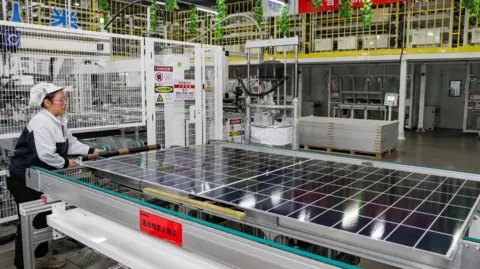The United States Department of Commerce is poised to implement significantly increased tariffs on imported solar panels originating from four Southeast Asian nations: Cambodia, Thailand, Malaysia, and Vietnam. These proposed duties, potentially reaching a staggering 3,521%, represent a dramatic escalation in the ongoing trade war between Washington and Beijing and have sparked considerable debate regarding the future of the US solar industry.
The investigation leading to these tariffs began approximately one year ago, prompted by concerns raised by several major American solar equipment manufacturers. These companies argued that Chinese-based solar panel producers were receiving unfair subsidies from the Chinese government, allowing them to flood the US market with heavily discounted products – a practice known as ‘dumping’ – thereby undermining domestic manufacturing efforts.
The proposed tariffs are specifically targeted at companies operating within these four Southeast Asian countries. Notably, Cambodian solar equipment exporters face the highest potential duties of 3,521%, attributed in part to what investigators perceived as limited cooperation during the Commerce Department’s investigation into alleged subsidy practices. Conversely, products manufactured in Malaysia by Chinese manufacturer Jinko Solar are anticipated to be subject to lower tariffs, around just over 41%. Trina Solar, another prominent China-based solar equipment producer with operations in Thailand, faces a significantly higher tariff of 375% for its Thai-produced panels.
The tariffs, formally known as countervailing and anti-dumping duties, are expected to be implemented alongside existing trade tariffs imposed by the Trump administration. The International Trade Commission (ITC) is scheduled to issue a final decision on these new tariffs in June, after which the Department of Commerce will determine the specific rates applicable to individual companies. The American Alliance for Solar Manufacturing (AASM) Trade Committee has strongly supported the investigation and welcomed the potential tariffs, stating they represent “a decisive victory for American manufacturing” and expose instances of ‘cheating’ by Chinese-headquartered solar companies.
In 2023, the United States imported nearly $12 billion in solar equipment from these four Southeast Asian countries. While proponents argue that these tariffs will bolster domestic US solar panel production, critics warn they could lead to increased costs for businesses and consumers who have benefited from the availability of cheaper solar energy solutions. The long-term economic impact remains uncertain, pending the ITC’s final ruling and subsequent implementation of the tariffs.

